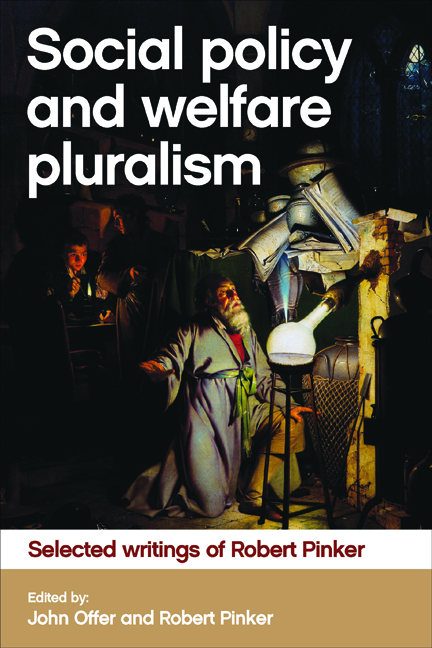Book contents
- Frontmatter
- Contents
- Acknowledgement
- Preface
- General introduction: Robert Pinker on rethinking approaches to welfare
- Introduction to Part One On social policy studies
- one The ends and means of social policy: a personal and generational perspective
- two Social theory and social policy: a challenging relationship
- three Stigma and social welfare
- four The welfare state: a comparative perspective
- five Richard Titmuss and the making of British social policy studies after the Second World War: a reappraisal
- Introduction to Part Two On social care, communities and the conditions for well-being
- six Report of the Working Party on the Role and Tasks of Social Workers: an alternative view
- seven The quest for community: from the Settlement Movement to the Griffiths Report: an historical perspective
- eight Citizenship, civil war and welfare: the making of modern Ireland
- Introduction to Part Three On welfare pluralism
- nine Golden Ages and welfare alchemists
- ten From gift relationships to quasi-markets: an odyssey along the policy paths of altruism and egoism
- eleven The experience of citizenship: a generational perspective
- twelve The right to welfare
- thirteen The prospects for social policy in the UK after the 2015 General Election
- Afterword On the post-Brexit prospects for social policy in the UK
- References
- Index
one - The ends and means of social policy: a personal and generational perspective
Published online by Cambridge University Press: 08 April 2022
- Frontmatter
- Contents
- Acknowledgement
- Preface
- General introduction: Robert Pinker on rethinking approaches to welfare
- Introduction to Part One On social policy studies
- one The ends and means of social policy: a personal and generational perspective
- two Social theory and social policy: a challenging relationship
- three Stigma and social welfare
- four The welfare state: a comparative perspective
- five Richard Titmuss and the making of British social policy studies after the Second World War: a reappraisal
- Introduction to Part Two On social care, communities and the conditions for well-being
- six Report of the Working Party on the Role and Tasks of Social Workers: an alternative view
- seven The quest for community: from the Settlement Movement to the Griffiths Report: an historical perspective
- eight Citizenship, civil war and welfare: the making of modern Ireland
- Introduction to Part Three On welfare pluralism
- nine Golden Ages and welfare alchemists
- ten From gift relationships to quasi-markets: an odyssey along the policy paths of altruism and egoism
- eleven The experience of citizenship: a generational perspective
- twelve The right to welfare
- thirteen The prospects for social policy in the UK after the 2015 General Election
- Afterword On the post-Brexit prospects for social policy in the UK
- References
- Index
Summary
Introduction
I have been asked to tell you what it was like to be a social policy student at the London School of Economics (LSE) in the mid-1950s, to describe some of the scholars who taught me and to recount how my views on the subject have changed during the intervening years. Preparing this kind of lecture at the age of 69 has led me to reflect on the ways in which different generations of students perceive the history of social policy, and the different vantage points in time from which each of us look back on our own lives.
The age range of a typical academic department extends over several generations. The oldest staff who taught me at LSE in the mid-1950s had been born before the First World War – a time when the Poor Law was the main provider of relief to the destitute. The events that had shaped their lives were, for my generation, already a part of history. Of course, we also shared some memories because we had all lived through the experiences of the Second World War and the creation of the post-war British welfare state.
The memories passed on across the generations can reach far back in time. As it happened, William Beveridge was still alive and visiting LSE when I was appointed to my first junior post in 1961. Beveridge had a study in the same building where I worked. He was then in his 82nd year, a small, physically frail man but manifestly still intellectually alert and active. He was busily engaged in trying to complete a major work on the history of wages and prices that he had started during the 1930s. It was one of my duties to keep a discreet eye on his welfare, making sure he had his morning cup of tea and helping him into his taxi when he wanted to go to the House of Lords. I still remember the kindness and consideration he showed me. On two occasions, he advised me on my research and talked at length about his early experiences as a social worker at Toynbee Hall, as a journalist and as a civil servant helping to set up a national system of labour exchanges.
- Type
- Chapter
- Information
- Social Policy and Welfare PluralismSelected Writings of Robert Pinker, pp. 35 - 46Publisher: Bristol University PressPrint publication year: 2017



